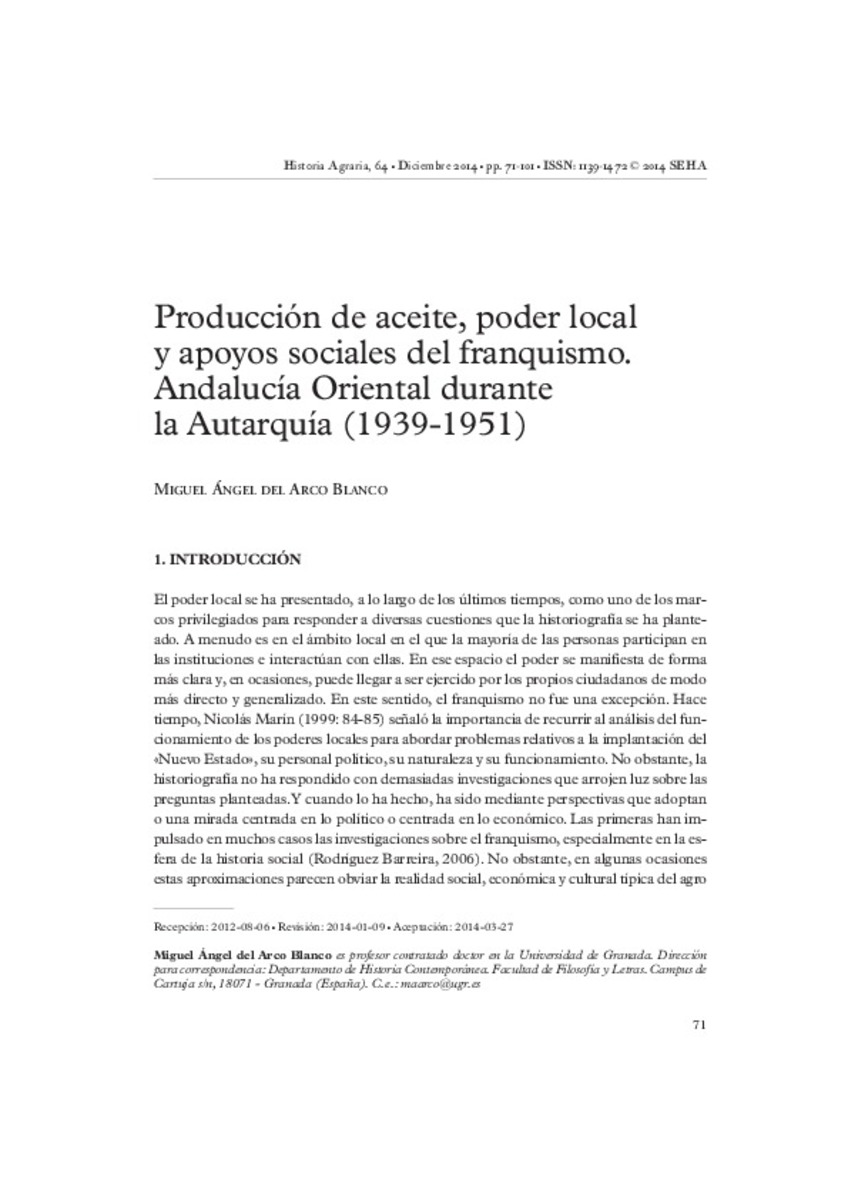| dc.contributor.author | del Arco Blanco, Miguel Angel | |
| dc.date.accessioned | 2016-02-17T10:04:34Z | |
| dc.date.available | 2016-02-17T10:04:34Z | |
| dc.date.issued | 2014-12 | |
| dc.identifier.issn | 1139-1472 | |
| dc.identifier.uri | http://hdl.handle.net/10234/150169 | |
| dc.description.abstract | Parte de la historiografía ha señalado el fracaso de las políticas autárquicas del «Nuevo Estado», pero no se ha profundizado en las implicaciones políticas que la autarquía tuvo para los apoyos sociales del Régimen y, también, para el franquismo. La gestión de la escasez de posguerra y de la política autárquica es fundamental para entender la perpetuación del «Nuevo Estado». En este trabajo pretendemos ahondar en un elemento clave en la gestión del poder local: la producción aceitera. Adoptando una aproximación política y económica del mundo rural, el artículo estudia el caso de Andalucía Oriental y en el papel de los poderes locales en la evolución y funcionamiento del sector oleícola. Se demuestra que, cara a sus apoyos sociales, los poderes locales franquistas (a los que muchos identificaban con el Régimen mismo) cumplieron parte de las promesas enarboladas en los primeros días de la Guerra Civil y, en ocasiones, se convirtieron en necesarios intermediadores con las instancias superiores, «defendiendo » los intereses del municipio y logrando generar adhesiones y consentimiento hacia el franquismo. | ca_CA |
| dc.description.abstract | A range of scholars have highlighted the failure of the «New State» [Nuevo Estado: name given by Francoist authorities to its political system] autarkic policies, but little attention has been given to the political implications of agricultural interventionism for the Franco regime and its grassroots supporters. How post‐war scarcity and autarky policies were managed is central to understanding the perpetuation of the «New State». This article explores one of the most important elements under local management: the production of olive oil. Applying both a political and socio‐economic approach to the rural world, this study examines eastern Andalusia and the role of local councils in the evolution and functioning of the olive oil sector. Local authorities fulfilled many of the promises made to their support base in the early days of the Civil War, sometimes acting as vital intermediaries between higher officials and local interests. By «defending» local interests they contributed to build support for the Franco regime. | ca_CA |
| dc.format.extent | 31 p. | ca_CA |
| dc.format.mimetype | application/pdf | ca_CA |
| dc.language.iso | spa | ca_CA |
| dc.publisher | Sociedad Española de Historia Agraria (SEHA) | ca_CA |
| dc.relation.isPartOf | Historia agraria: Revista de agricultura e historia rural, nº 64, pp. 71-101 | ca_CA |
| dc.rights | © 2014 SEHA | ca_CA |
| dc.rights.uri | http://rightsstatements.org/vocab/InC/1.0/ | * |
| dc.subject | autarquía | ca_CA |
| dc.subject | aceite | ca_CA |
| dc.subject | poderes locales | ca_CA |
| dc.subject | apoyos sociales | ca_CA |
| dc.subject | franquismo | ca_CA |
| dc.subject | autarky | ca_CA |
| dc.subject | olive oil | ca_CA |
| dc.subject | local authorities | ca_CA |
| dc.subject | social support | ca_CA |
| dc.subject | francoism | ca_CA |
| dc.title | Producción de aceite, poder local y apoyos sociales del franquismo. Andalucía Oriental durante la Autarquía (1939-1951). | ca_CA |
| dc.type | info:eu-repo/semantics/article | ca_CA |
| dc.subject.jel | Q13 | ca_CA |
| dc.subject.jel | Q15 | ca_CA |
| dc.subject.jel | R14 | ca_CA |
| dc.subject.jel | R5 | ca_CA |
| dc.rights.accessRights | info:eu-repo/semantics/openAccess | ca_CA |
| dc.relation.publisherVersion | http://historiaagraria.com/info_articulo.php?id=670 | ca_CA |







